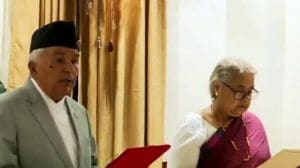Arafat only brick left in PLO complex wall
No one was at work on next year’s curriculum at the Palestinian Education Ministry. No one was making plans at the Ministry of Local Go...

No one was at work on next year’s curriculum at the Palestinian Education Ministry. No one was making plans at the Ministry of Local Government, either.
In the street outside, a torn map of rolling Palestinian farmlands and groves suggested someone had been searching inside the empty, ravaged building. The massive complex of the Palestinian Preventive Security force stood vacant, its walls and interior charred.
The situation elsewhere was hard to ascertain under an Israeli military curfew on Ramallah. There was no sign the ministries of health, housing, industry and trade, communication, public works, social affairs were functioning in any way.
And Arafat himself, the would-be Palestinian president, sat another day in a ruined headquarters ringed by Israeli troops and barbed wire. After a week of Israeli attacks across the West Bank, these vestiges were all that remained of the Palestinian Authority, the institution that was supposed to administer Palestinian cities in the West Bank and Gaza Strip after the Israeli withdrawals of the mid-1990s.
‘‘There is no Palestinian Authority,’’ said Saeb Erakat, an Arafat aide and the minister of local government. To Palestinians, the end of Arafat and his Authority would signal that the long period of halting peace negotiations known as the Oslo process is dead and buried. The 1983 Oslo accords resulted over the following years in Israeli withdrawals from 18 per cent of West Bank and about two-thirds of Gaza Strip.
‘‘If Arafat is eliminated, then there will be no government. He is the last brick in a wall that has been ruined,’’ said Abdul Jawwad Saleh, a member of the Palestinian legislature and long an Arafat critic.
The dire straits of Arafat and the Authority have made them more sympathetic in Palestinian eyes eighteen months ago, when Palestinians complained about corruption and mismanagement. Now, they cling to their survival as a means of stability and source of reconstruction. ‘‘This was not the government we wanted,’’ said Adel Yahya, director, independent Palestinian Association for Cultural Exchange. “Now, we are afraid of its disappearance.’’
(LATWP)
Photos






- 01
- 02
- 03
- 04
- 05

























